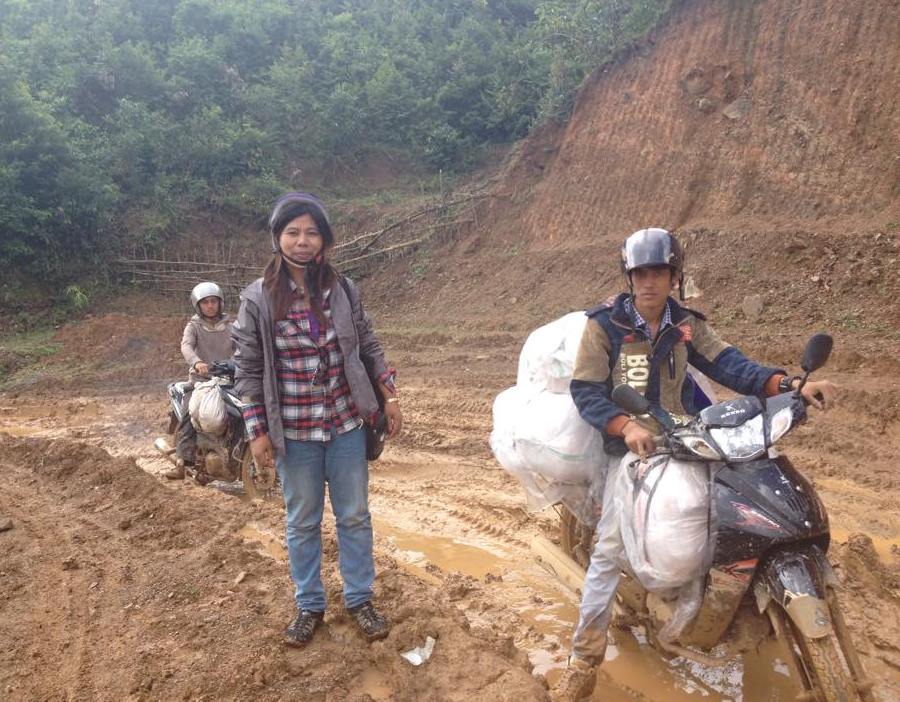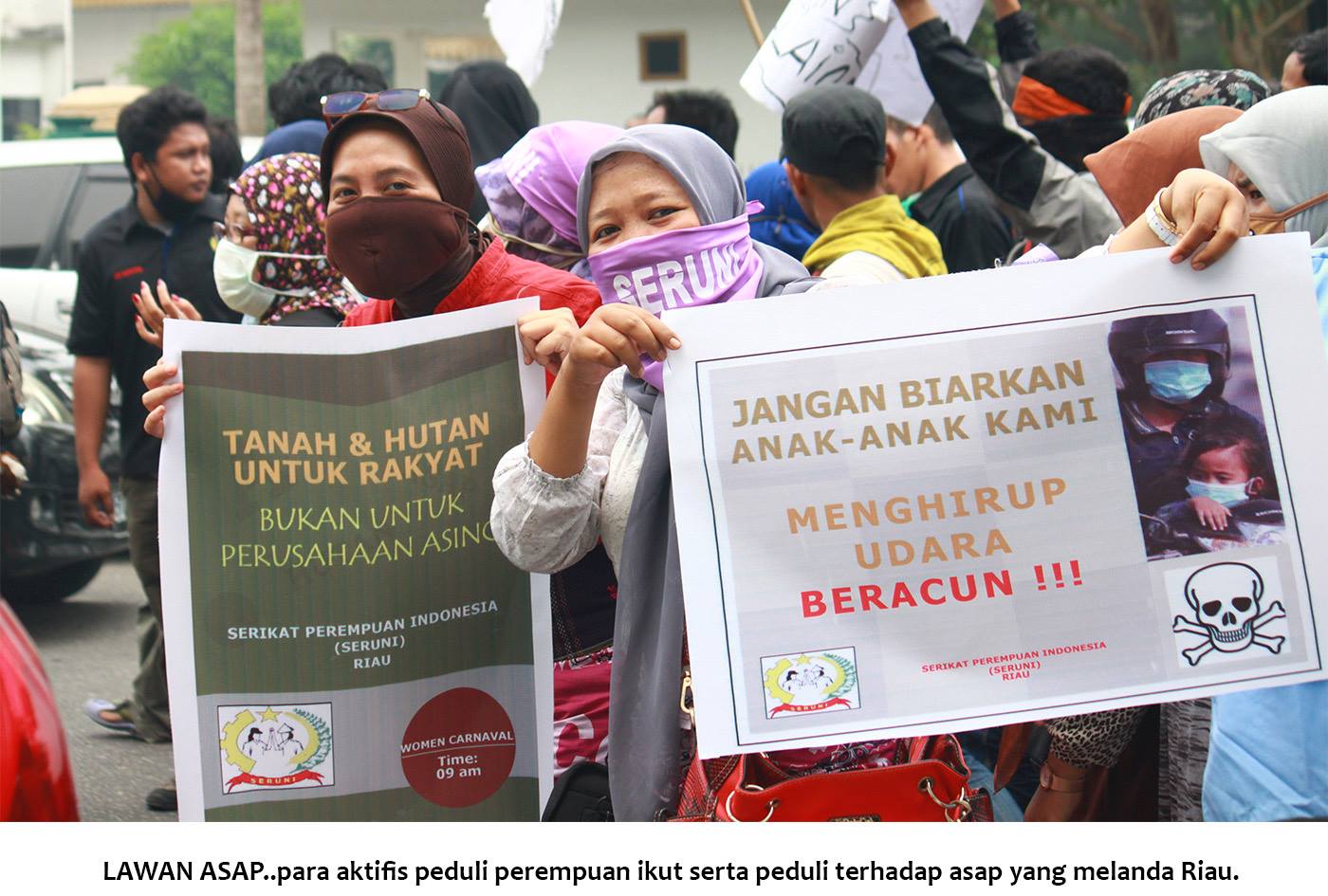From landslides and floods to earthquakes and forest fires—environmental crises are plaguing the people of Southeast Asia. The people most affected by these crises—often solely portrayed as victims—are courageously rebuilding their communities to be more resilient and sounding the alarm about the continued exploitation of natural resources by unregulated companies. These stories spotlight both the impact of climate change on poor communities and women’s critical role. Women are leading emergency responses even as they are often the most impacted. In Indonesia, FAMM (Forum Aktivis Perempuan Muda-Indonesia)—a 300+ member young women’s alliance co-created with JASS—is raising young people’s awareness about the impact of the current forest fires and haze pollutions on communities. Myanmar JASS ally, Women’s Hand Myanmar Foundation (WHMF), is leading flood relief efforts in four of Chin State’s remote areas which are not reached by the government or donor organizations.
Indonesia’s Forest Fire -Affected Communities
Land conservation is protected by law in Indonesia, but private companies are illegally setting forest fires to make way for palm oil plantations. According to the Guardian, “More than 117,000 forest fires have been detected via satellite in Indonesia this year, most of which are believed to have been started deliberately to clear land for farming.” Meanwhile, the government is not responding fast enough. Herlia Santi, member of FAMM-Indonesia from Rupari, Riau province laments: “We are angry and fed up of the government’s slow response. It’s been going on for years yet they are unable to setup fast emergency response for vulnerable residents: children, women and elders. It seems they underestimate the impact.“ The forest fires in Sumatra and Kalimantan have produced hazardous levels of air pollution that continue to intensify. The pollution threatens local residents’ health, especially children and the elderly.
FAMM–Indonesia Responds
Indonesian women activists are joining anti-forest fires actions and drafting proposals to prevent fires. “One of the significant strategies currently being put forward as a short-term solution is creating land burning schedules that sub-district heads, village heads, and indigenous leaders can implement. It will help prevent fires from spreading to other lands and revive indigenous wisdom and sanctions for negligence,” says Niken Lestari, national coordinator of FAMM-Indonesia.
With limited resources, Kalimantan and Sumatera members of FAMM-Indonesia are working through their organizations and networks to mitigate the effects of the haze pollution. Herlia Santi says that she and her team are providing health care and monitoring the impact of the haze on individuals and communities. They submit these results to Indonesia’s National Commission on Human Rights insisting that this crisis is a violation of the community residents’ basic human rights.
Mariamah Achmad or Mayi, an activist working in Yayasan Palung from West Kalimantan is raising awareness through her organization, Sekolah Lahan Gambut (Peatlands School) about peatlands (organic wetlands) as a source of livelihood not just as a product of a plantation. “First, the fires cleared the forests. Then the land became dry. There is also no irrigation system in peatland areas so once the peatlands are burned, there is little that the community can do. This is public knowledge. But the world’s demand for palm oil has pushed this knowledge aside,” explains Mayi.
FAMM-Indonesia is taking action in the face of government inaction. “We are trying to do more by documenting stories and reflections from our members who are affected and involved in the action against forest fires. Our members are organizing campaigns to raise awareness, pushing for tougher law enforcement, and creating popular publications to anticipate the recovery and long-term prevention efforts of forest fires,” says Niken Lestari, national coordinator of FAMM-Indonesia.
Flooding in Chin State
 Landslides and flash floods are common in Myanmar. The worst flooding to hit the country in decades has affected 1.6 million people and killed hundreds since July. 2,910 families were left homeless in Chin State’s nine townships. Vast tracts of crucial “rice bowl” areas have also been devastated, thus affecting livelihoods.
Landslides and flash floods are common in Myanmar. The worst flooding to hit the country in decades has affected 1.6 million people and killed hundreds since July. 2,910 families were left homeless in Chin State’s nine townships. Vast tracts of crucial “rice bowl” areas have also been devastated, thus affecting livelihoods.
Women and children are among the most affected. According Chin State’s customary law, women are not allowed to rebuild their own homes. “If women are widows or single or if a household is female-headed, they’ll be left homeless especially if they have no money to buy land. Women are the second-class citizens under traditional laws and social and cultural norms…” says Mai T. Sui Leng (or Sui Sui), director of WHMF.
Solidarity plays a crucial role. In areas unreached by government or donor support women’s organizations are stepping in as explains Sui Sui, “We in WHMF opted to provide emergency response and support for victims who could not be reached by any assistance…” Despite the many challenges that her organization is facing, Sui Sui remains optimistic. “WHMF’s emergency response initiatives will continue. WHMF plans to support two more villages that could not be reached by assistance. It is very difficult to go there and transportation fees are so high. We can go only by motorcycle. I am confident that more local and international donations will pour in so we can deliver the 1,000 packed relief goods and ‘dignity’ kits for women.”
JASS created a Myanmar Fund to support WHMF’s fundraising initiative. WHMF urgently needs US$1,500 to transport and deliver “dignity kits” and food packs for women and their families. Please visit our donate page to learn more and pitch in.
Climate Justice: the time is now
The devastating human and environmental impact of climate change in Southeast Asia is undeniable. While many factors are at play, the exploitation of natural resources—such as wide-scale logging and forest-clearing —are major contributors to the recent landslides, flood disaster and haze crisis that Myanmar and Indonesia are confronting. As policymakers become increasingly concerned with mitigating the impact of climate change and supporting “resilience,” we can learn a lot from grassroots women activists who are organizing their communities to respond and prevent future problems. They are raising the alarm about the deeper and lasting impacts of the deregulated and global scramble for resources. With the Cop 21: UN Climate Change Conference set for Nov. 30-Dec. 11 in Paris, how do we make sure that women who are on the frontlines improvising responses with their communities have a voice at the table?


























